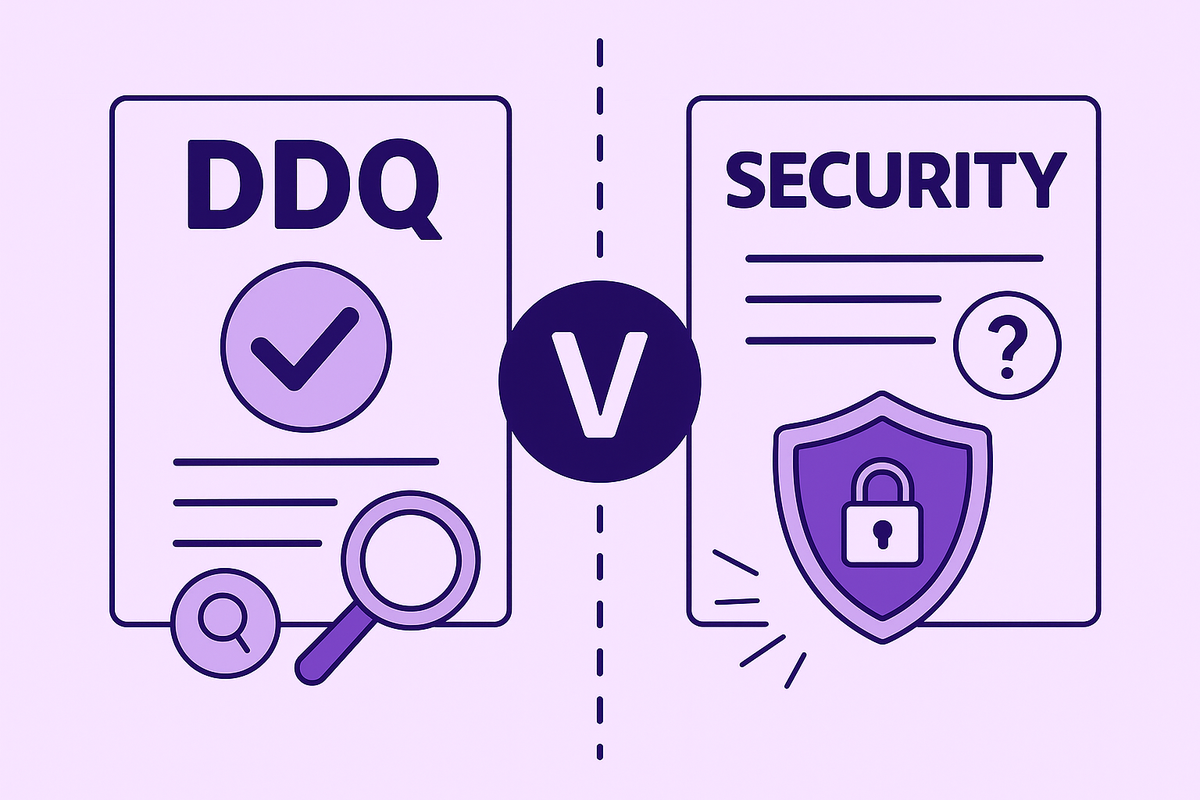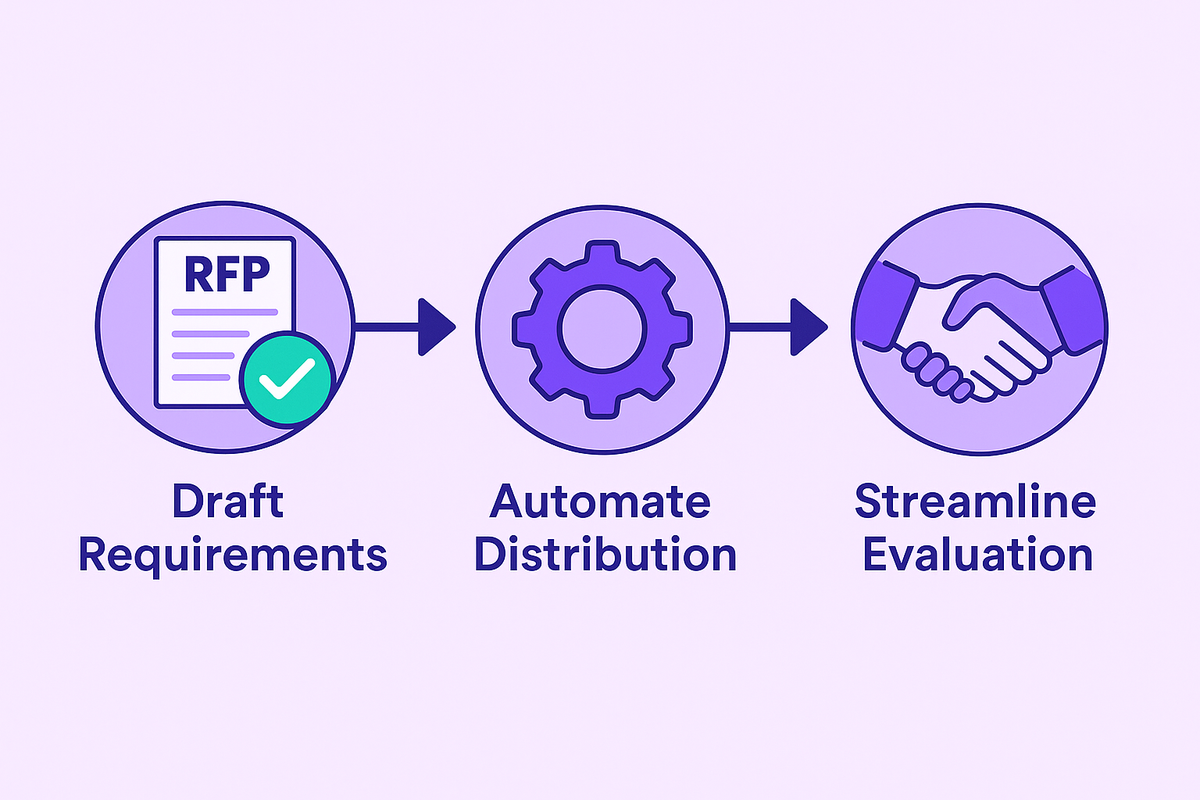DDQs vs. Security Questionnaires: What’s the Difference?
July 21, 2025
By
Evie Secilmis

In the world of business and security, understanding key documents is crucial. DDQs and Security Questionnaires are two such documents. They play vital roles in vendor management and procurement processes. But what exactly are they, and how do they differ?
DDQs, or Due Diligence Questionnaires, focus on assessing potential vendors. They delve into financial, legal, and operational aspects. This helps organizations mitigate risks and ensure compliance.
On the other hand, Security Questionnaires evaluate a vendor's security practices. They ensure that data and systems remain protected. This is especially important in industries with high regulatory demands.
Both DDQs and Security Questionnaires are often used alongside RFPs. RFPs, or Requests for Proposals, solicit detailed proposals from vendors. Understanding these documents can streamline vendor assessments and lead to better business outcomes.
What Are DDQs? Understanding the Meaning and Purpose
DDQs, or Due Diligence Questionnaires, are critical tools in vendor assessment. They help organizations understand the capabilities and risks associated with potential partners. Through a comprehensive set of questions, DDQs dive deep into a vendor’s operations.
The primary aim of DDQs is to mitigate potential risks. They achieve this by ensuring thorough evaluation of a vendor’s stability and compliance. This process includes examining financial health, legal standings, and operational procedures.
The questions in a DDQ often cover several core areas:
- Financial stability
- Legal compliance
- Operational capacity
- Management structure
These questions enable organizations to make informed decisions. By gaining insights into these areas, companies can predict how potential partners will perform.
Understanding the DDQ meaning and its importance aids businesses in safeguarding their interests. It helps avoid pitfalls associated with partnerships that don't meet regulatory standards. Moreover, it allows companies to establish lasting, beneficial relationships with their vendors. Customizing DDQs to suit specific needs also ensures that no stone goes unturned in the assessment process.
What Are Security Questionnaires? Key Features and Uses
Security questionnaires play a crucial role in assessing a vendor's ability to protect data. They focus primarily on a vendor’s security protocols and practices. These questionnaires are vital in evaluating how well a vendor can safeguard sensitive information.
Key features of security questionnaires often include various topics. Each topic focuses on critical security aspects that could impact a business:
- Data protection measures
- Cybersecurity standards
- Incident response plans
- Staff training in security
Organizations use security questionnaires to ensure the integrity of their data systems. With increasing cyber threats, understanding a partner's security posture is essential. Security questionnaires provide insights into a vendor’s defense mechanisms against potential breaches.
These tools are indispensable in industries with stringent security requirements. They help companies determine if a vendor meets necessary security standards. By using these questionnaires, businesses can mitigate risks associated with data breaches and ensure compliance with relevant regulations. As a result, security questionnaires have become invaluable to vendor assessment processes.
DDQs and RFPs: How They Relate and Differ
DDQs (Due Diligence Questionnaires) and RFPs (Request for Proposals) are both important in vendor selection. While they are often used together, they serve distinct purposes. Understanding these purposes can improve procurement processes.
DDQs focus on assessing the reliability of a potential partner. They seek to gather detailed information about a company's financial standing, legal compliance, and operational capacity. This thorough evaluation helps to mitigate potential risks.
On the other hand, RFPs are designed to solicit proposals for specific projects or services. They outline the requirements and criteria for the project, allowing vendors to submit tailored proposals. This facilitates a structured comparison of potential vendors.
Despite their differences, DDQs and RFPs are intertwined. Businesses often use them together to ensure comprehensive evaluations of potential vendors:
- Both provide frameworks for comparison.
- They offer insights into vendor strengths and weaknesses.
- Each brings its own focus, whether on operational stability or project-specific proposals.
In conclusion, recognizing how DDQs and RFPs complement each other can streamline and enhance the vendor selection process.
Comparing DDQs and Security Questionnaires: Main Differences
DDQs and Security Questionnaires are vital tools, but they target different aspects of vendor evaluation. Understanding these distinctions is crucial for effective vendor management.
DDQs focus on the broader evaluation of a vendor's capabilities. They assess a company's financial health, legal compliance, and operational capacity. The objective is to grasp the overall stability and reliability of the business partner.
In contrast, Security Questionnaires focus specifically on a vendor's security measures. They examine data protection protocols, cybersecurity policies, and incident response capabilities. This assessment ensures that a vendor can safeguard sensitive information and systems.
It's helpful to note these key differences:
- DDQs: Evaluate overall vendor capabilities and risk factors.
- Security Questionnaires: Assess the vendor's security measures and protocols.
- Both questionnaires serve different purposes but are essential for thorough due diligence.
Integrating insights from both allows organizations to make informed decisions, thereby reducing risks and ensuring robust vendor partnerships. This comprehensive approach is increasingly important with evolving security challenges and regulatory demands.
When to Use DDQs, Security Questionnaires, and RFPs
Choosing the right tool for vendor assessment can significantly impact the outcome. Each document serves a specific purpose and should be used accordingly. Understanding when to deploy each is key to effective procurement.
DDQs are best used when evaluating the overall potential of a vendor. They are essential during the early stages of vendor selection. Security Questionnaires, on the other hand, are crucial when the focus is on data protection and cybersecurity. Use them to validate that a vendor meets necessary security standards.
RFPs facilitate the solicitation of proposals for specific projects or services. They help define project requirements and expectations clearly. To decide which document to use, consider:
- DDQs: Initial vendor assessment.
- Security Questionnaires: Evaluating cybersecurity measures.
- RFPs: Soliciting project proposals.
Use them in tandem to ensure a well-rounded evaluation process, ensuring all aspects of vendor capabilities are covered. This approach allows organizations to mitigate risks effectively.
Best Practices for Managing DDQs and Security Questionnaires
Effective management of DDQs and Security Questionnaires requires careful planning and execution. Organizations should prioritize these documents to ensure a smooth vendor assessment process. Ensure consistency and accuracy to avoid misinterpretation of vendor capabilities and risks.
Automating the process can significantly reduce manual workload and minimize errors. Utilize software tools to streamline distribution and analysis. Collaboration across departments is also crucial. Teams like legal, finance, and IT should work together to provide comprehensive input.
A few key practices to consider include:
- Regular updates: Keep documents current with industry standards.
- Standardization: Use consistent formats for clarity.
- Cross-department collaboration: Involve relevant teams for thorough evaluations.
Implementing these practices can lead to enhanced vendor relationships and more informed decisions. They form the backbone of effective risk management and successful project outcomes.
Conclusion: Streamlining Vendor Assessment
Streamlining vendor assessment using DDQs, Security Questionnaires, and RFPs is vital for mitigating risks and ensuring compliance. By understanding their distinct roles and integrating best practices, organizations can foster efficient evaluations and secure better vendor relationships. This comprehensive approach aids in achieving successful and secure project outcomes.
Want to learn more about DDQs? Check out the article: What is a DDQ?
Share this post
Link copied!





















